LANCASTER JETHAWKS GROUNDED BY MLB
MiLB's landscape undergoes a drastic change after its contraction by MLB
LANCASTER, Calif. – After having its 2020 season canceled due to the COVID-19 pandemic, Minor League Baseball is back in 2021. The crack of the bat! The whirr of the ball! The eternal dilemma at the hot dog stand – ketchup or mustard!
Over 100 minor league baseball teams returned to the diamond in April and May. The same, however, cannot be said for 43 other teams.
These 43 teams were dropped from the minor league system as part of a far-reaching overhaul engineered not by Minor League Baseball but, instead, by its overlords – Major League Baseball and Commissioner Rob Manfred.
Of the 43 teams that were cut, one – just one – was from California.
That team is the Lancaster JetHawks, in the high desert reaches of far northern Los Angeles County.
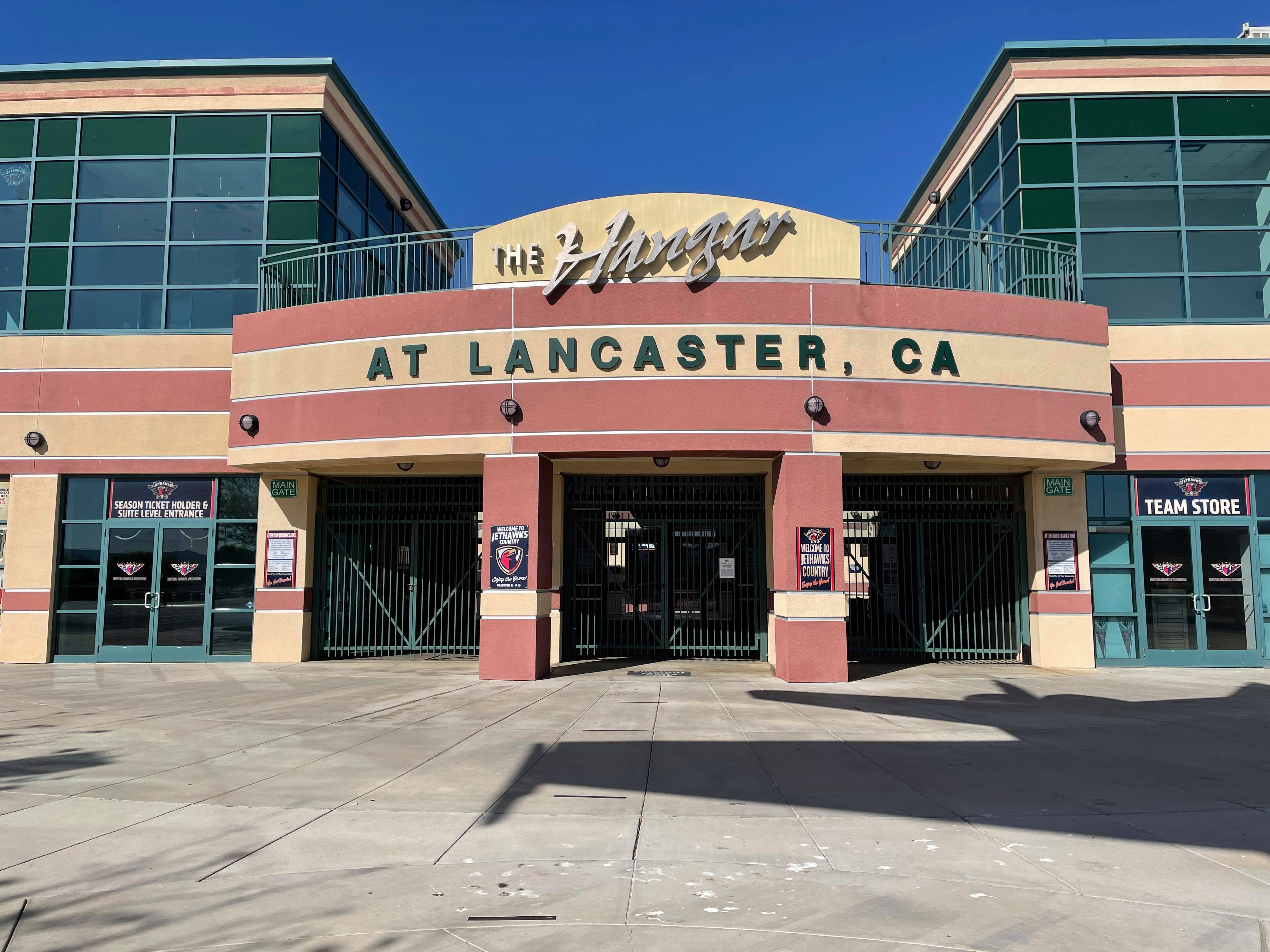
The Hangar was home to the Lancaster JetHawks, a team that existed from 1996 - 2020. Photo by Tony Quach.
Named after the city's association with the aerospace industry, the JetHawks were a Class-A Advanced team that played in the now-defunct California League. The history books declare that the JetHawks lasted for 24 years, from 1996 until 2020, and the two-time California League Champions (2012 and 2014) played their home games at a park that was called The Hangar.
Minor league baseball has been part of the fabric of America for roughly 120 years. That smell of hot dogs and popcorn, the small-town ballparks, the bus rides and keening ambition of the younger players, the fading but still-burning hopes of the older guys to make the show, as the big leagues are called – all of this, and more, is deeply woven into the rhythm of in spring and summer in the United States.
Part of the reason why, of course, is geography. Over these 120 years, the minor league system grew to encompass the entire country – by 2019, 160 teams across 14 leagues (not including teams from the Arizona, Gulf Coast and Dominican Summer League).
A little acronym-ese to start making sense not only of the baseball landscape but of what happened. The major leagues go by the three letters MLB. The minors go by four: MiLB.
In October 2019, Baseball America's J.J. Cooper reported an MLB proposal to change all of this.
The plan would see 42 teams – ultimately, 43 – get cut.
By "cut," that is, they would lose their affiliation status with a MLB franchise.
The JetHawks, to the surprise of the organization and its fans, appeared on the list.
Map of Minor League Teams Cut
Dean Anthony, a 47-year-old JetHawks fan and an actor in Los Angeles, could not believe the news.
"I didn't think anything would happen because the JetHawks are so engrained in the fabric of the community in Lancaster," Anthony said. "Nobody would expect something like this to happen."
On Sept. 30, 2020, the plan became real.
How? Why? On that day, what's called the Professional Baseball Agreement between MLB and MiLB expired.
The PBA governs the partnership between MLB and MiLB.
Without a new deal, MLB seized control of MiLB operations.
The number of MiLB teams was reduced from 160 to 120.
In total, 43 teams were cut. Three additional teams from independent leagues were added to the new minor league system. Thus, 160 to 120.
The reduction also meant that each MLB team would have only four affiliated minor league teams, one from each of the following – Triple-A (AAA), Double-A (AA), High-A (A+), and Low-A (A). Previous classifications such as Short-Season A and Rookie were eliminated from the system.
The three independent baseball teams – the Sugar Land Skeeters, Somerset Patriots and St. Paul Saints – were offered invitations to become affiliates with three big leagues clubs.
All three would accept and begin a new chapter.
Newly Structured Minor League System
Click on each team to see their new farm system
The MiLB headquarters in St. Petersburg, Fla., closed. MiLB operations are centered now out of MLB's New York headquarters.
The closure of the MiLB office also marked the end of 11 MiLB leagues, entities such as the International, Eastern, Midwest and California League. All had existed for decades.
After 2020, no more.
In their place came new leagues such as Triple-A East, Double-A Northeast, High-A Central, Low-A West and so on.
MLB's contraction robbed Lancaster of its only professional sports team. All that remains is a ballpark filled with countless memories the team shared with its fans and members of the Antelope Valley.
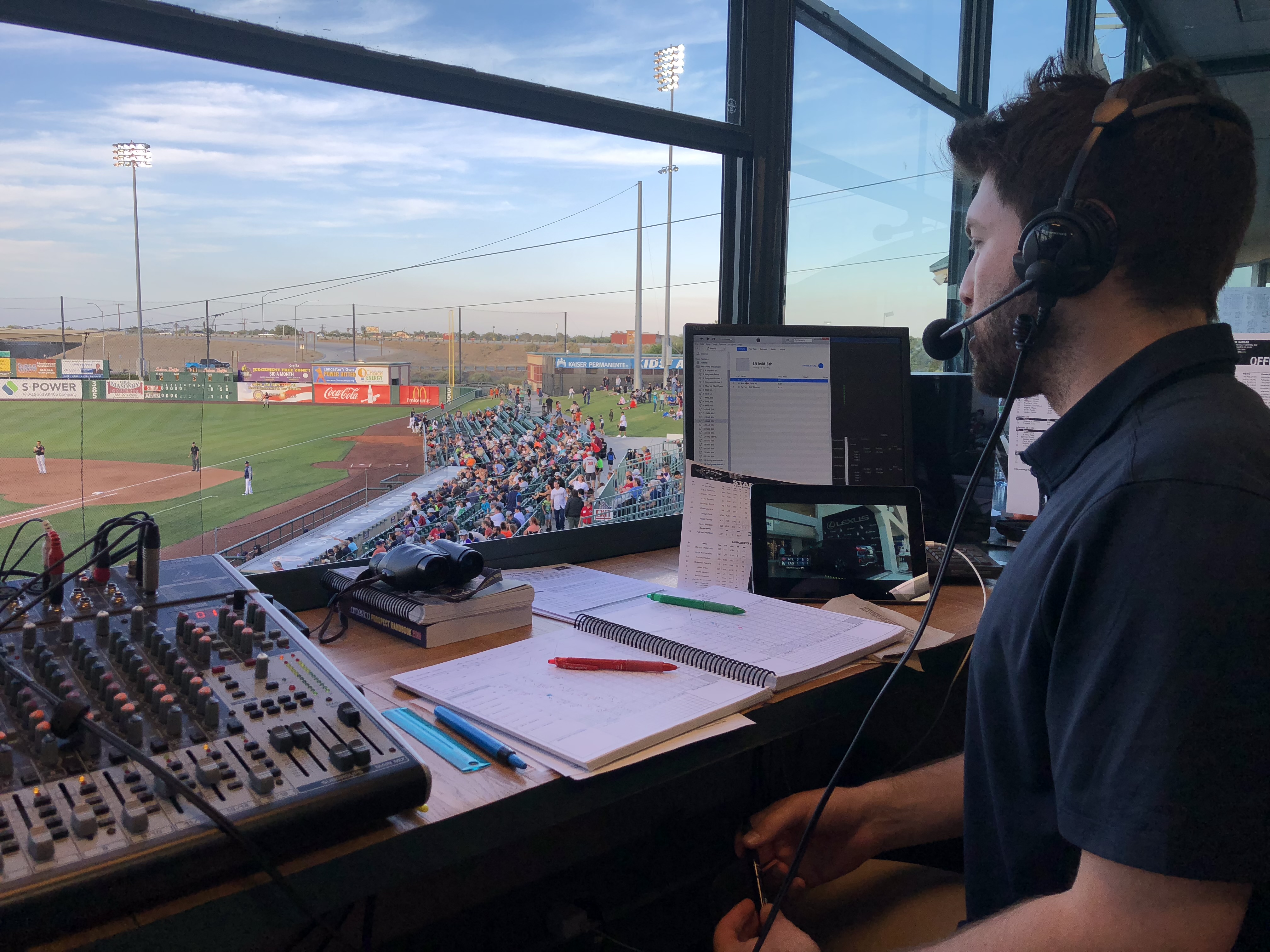
Jason Schwartz calling a game for the Lancaster JetHawks. As the director of broadcasting and media relations, this was his longest-tenured job. Photo courtesy Jason Scwartz.
Jason Schwartz, 32, was the director of broadcasting and media relations, and the voice of the JetHawks for nearly eight seasons.
"I knew how many people this decision affected and I think that was the hardest part," Schwartz said. "I know there are a lot of fans in Lancaster who dedicate so much of their lives to the team and I felt sad for them."
This not only affected the fans, but – of course – employees like Schwartz as well.
While it was difficult for his JetHawks tenure to come to an end, Schwartz remains grateful.
"It's a great honor. It's a great experience and not everyone gets to do it for one season, let alone eight," Schwartz said.
Many, if not all, of the JetHawks' staff were forced to find jobs elsewhere.
One employee had been with the organization since its inception in 1996.
John Laferney, nicknamed "JetHawk John," was the team's director of ballpark and baseball operations. For more than 20 years, Laferney was the JetHawks' go-to guy.
Whether he was working as an usher, selling team merchandise, driving players to or from the airport, even dressing up as KaBoom, the JetHawk mascot, Laferney did it with a smile. The only job he didn't do, Laferney jokingly said, was drive the team bus.
"I was pretty upset," the 63-year-old Laferney said. "This is all I have been doing for 25 years, and I put my heart, blood, sweat and tears into this place."
HISTORY OF MINOR LEAGUE BASEBALL
It wasn't until 1999 that the organization running the thing adopted the moniker "Minor League Baseball."
For its first 98 years, dating to its founding, it was known as the National Association of Professional Baseball Leagues.
On Sept. 5, 1901, a number of representatives from different minor leagues came together to form the NAPBL – after the National League and American League, the two professional major leagues, stole players.
NAPBL's goal was to protect the independence of the minor leagues while the NL and AL feuded.
Two years later, the NAPBL, AL and NL struck an agreement in which all leagues recognized each other's contracts. This deal featured three main points: it created minor league classifications, imposed both roster and salary limits and instituted a system for drafting players.
Hall of Fame baseball executive Branch Rickey is perhaps best known for bringing Jackie Robinson to the Brooklyn Dodgers in 1947, breaking the majors' color barrier. Rickey, meanwhile, also revolutionized the idea of the minor-league "farm system" – that is, a feeder system to develop and prepare younger players for the big leagues.
In today's parlance, we would call this "vertical integration."" Other teams caught wind of Rickey's idea and, like him, created their own farm systems.
To be clear, the minor-league system became highly classified. To get to the show – again, the majors – typically a player would advance from an MLB franchise's AAA team. An example: in recent years, the Los Angeles Dodgers' AAA team has been based in Oklahoma City, also nicknamed the Dodgers. Another: the Los Angeles Angels' AAA team is in Salt Lake City, nicknamed the Bees.
For nearly 60 years after Rickey, the farm system hummed along – typically a source of civic pride. When the Class A Dayton Dragons began play in 1988, the team instantly became a hot ticket. According to the team website, each and every home game at its 8,360-seat stadium has been a sellout since Day One – a streak now well over 1,000 games, a record for sports in North America.
Some of baseball's greatest talents came up from the farm – among them, Hall of Famers Joe DiMaggio and Ken Griffrey Jr. and current star Mike Trout.
The farm system also left its mark on any number of movies that have left an imprint on American culture. Just to pick two:
Field of Dreams – a movie about a man who built a baseball field after hearing a voice from his cornfield in Iowa. Silly as that sounds, one of the most memorable quotes from the movie – "People will come, Ray. The one constant through all the years, Ray, has been baseball."
In a way, this quote is the epitome of minor league baseball. Whether it's in state capitals, or in a small rural community, or even in the middle of nowhere, as long as there's baseball, fans young and old will flock to the ballpark.
Bull Durham – a romantic sports comedy movie that depicts the players and fans of the Durham Bulls, a real-life minor-league team in Durham, North Carolina.
Finally, the farm system became known far and wide as the venue where management and fans understood they were in it together to have, well, fun. If MLB games were sometimes bound by tradition and protocol, the minors were the place to do – to try – almost anything.
If the Angels' AAA affiliate is nicknamed the Bees, a nod to Utah's heritage, its AA team in 2021, based in Madison, Alabama is called – this is for real – the Rocket City Trash Pandas.
The minor leagues are home to some of the most outrageous team names in recent history – the Jacksonville Jumbo Shrimp and the El Paso Chihuahuas. There's even a team called the Akron Rubber Ducks.
Minor league promotions were just as wacky.
In 2013, the Lehigh Valley IronPigs held a "Celebration of Life" Night. The team partnered with a local funeral home to give a lucky fan a mortuary package valued at nearly $10,000.
The Hudson Valley Renegades had a "Toilet Seat Cushion Night" back in 2007 where they gave the first 3,000 fans in attendance a toilet seat cushion. It doubled as a stadium seat.
The Altoona Curve hosted what they called an "Awful Night" – with the light-hearted "goal" of giving fans a bad experience at the ballpark. Experiences: bad music, deliberately poor public address announcing, random giveaways like free sporks and a picture of the team's general manager's gallbladder.
Only in the minors can you find weird and unique promotions like these.
"This is why I love minor league baseball," Laferney said. "It's good, wholesome family fun."
All the same, much like Rickey saw a new way in the 1940s, MLB executives – looking out at the end of the 2010s to the 2020s and beyond – saw a different future. They wanted change.
That change, they believed, would enhance their teams' player development pipeline. By taking control of the minors, MLB teams would be able to streamline their prospects' development.
Baseball continues to evolve. Simply put, there are more resources available than before.
To name a few: better facilities, new technologies such as motion capture sensors, and workout and nutrition plans available at these young athletes' disposal.
Young talent is the driving force behind the success of some big league teams. For that to be possible, one must have a strong farm system. It's no surprise that MLB executives want the power to control their team's future.
Indeed, some prospects are so talented that they spend little to no time in the minors before heading to the majors.
Consider Garrett Crochet. He was drafted out of the University of Tennessee, the Chicago White Sox's No. 11 overall pick in the 2020 MLB Draft. Nearly three months later, he made his major league debut.
FINAL REALIGNMENTS AND RAMIFICATIONS
Formally, the legal and business maneuvering that began with the September 2019 end of the PDA led in 2021 with 120 minor league teams accepting invites to join – another acronym – the PDL.
The Professional Development League.
From MLB's perspective, a realignment of the minors came with distinct benefits:
Player salary increase, ranging from 38 to 72% for the 2021 season; modernized facility standards better suited for professional athletes; improved amenities and working conditions for players and staff; and better geographical alignment and less in-season team travel.
As for the unaffiliated 43 teams, some found they could still play ball – but under different circumstances.
Some joined summer collegiate leagues such as the new MLB Draft League and the Perfect Game Collegiate Baseball League.
A combination of six teams from the defunct Carolina, Eastern and New York–Penn League make up the MLB Draft League, while two other NYPL teams joined the PGCBL.
The 10 other teams in what was the Appalachian League were rebranded into new franchises after MLB converted the circuit into a collegiate wooden-bat league.
Some took a different route and joined independent baseball leagues: the American Association, Atlantic League, Frontier League and Pioneer League. These leagues are affiliated with MLB as “Partner Leagues” but – and this is critical – not with an MLB franchise.
Being affiliated with a franchise was the key to the former system – the Rickey way.
The JetHawks had a chance to remain affiliated with the Colorado Rockies.
The final minor league spot could have been theirs, if the Fresno Grizzlies had declined the invitation to become the MLB Colorado Rockies' new Low-A affiliate. The Grizzlies, though, said yes to Colorado.
For Lancaster, that meant no more minor-league baseball.
To many, the JetHawks were more than just a baseball team. They were heavily involved with the Lancaster/Antelope Valley community.
"We would do different community events," Laferney said. "We started a JetHawks Baseball League with the kids from the Boys and Girls Club in Lancaster and Palmdale for three years [from 2017-2019]."
Anthony recalled the JetHawks hosting any number of special events: "Christmas in July" and Girl Scout and Boy Scout sleepovers at the ballpark.
"[It] gave them great satisfaction to give something back to the community and give these families from life," Anthony said. "Things like this take you away like a movie. This takes you to a different place [and] gives you something to hope for."
The Hangar was the site of many summertime memories for players, employees and families. Per Newsday's Laura Albanese, in 2019, Manfred said one of the reasons behind the minor league cuts was due to inadequate facilities.
Perhaps elsewhere. But not The Hangar. According to the city of Lancaster, the $14.5 million stadium first opened in 1996. It has 4,600 seats but can accommodate 7,000 fans.
Operating expenditures = The annual city costs for operating and maintaining the facility.
Capital expenditures = Building costs plus stadium improvements and upgrades.

A retired NASA F/A-18A Hornet aircraft that serves as an iconic landmark in front of "The Hangar," once home to the Lancaster JetHawks. Photo by Tony Quach.
One of the first things fans see when they come to the ballpark is a retired NASA F/A-18 Hornet aircraft mounted on display at the front entrance.
Lancaster City Manager Jason Caudle said any suggestion the Hangar might be inadequate would be "complete bullcrap."
"From a maintenance perspective, we would put our ballpark up against anybody," Caudle said. "The grass, the lighting, the stands, the experience, go down the list, it's great."
The JetHawks had a lease with the city until 2024. But, Caudle said, both parties have agreed to terminate the lease.
"We're working with them to figure out what that lease arrangement looks like, so that's just some legal stuff," Caudle said. "We've got a great relationship with them, so it's not going to be an issue."
Through the early spring of 2021, the stadium was used as a COVID-19 testing site.
After?
It's still available for baseball.
Indeed, The Hangar is home to a different team – the University of Antelope Valley's baseball team, the Pioneers.
According to UAV's sports information director Andre Harrell, the city said the Pioneers could use the stadium as their home venue this season. It remains to be seen if this arrangement can be longer term.
Big picture, the city needs to figure out what to do with it – that is, how to make money at it.
THE VIEWS FROM INSIDE THE HANGAR
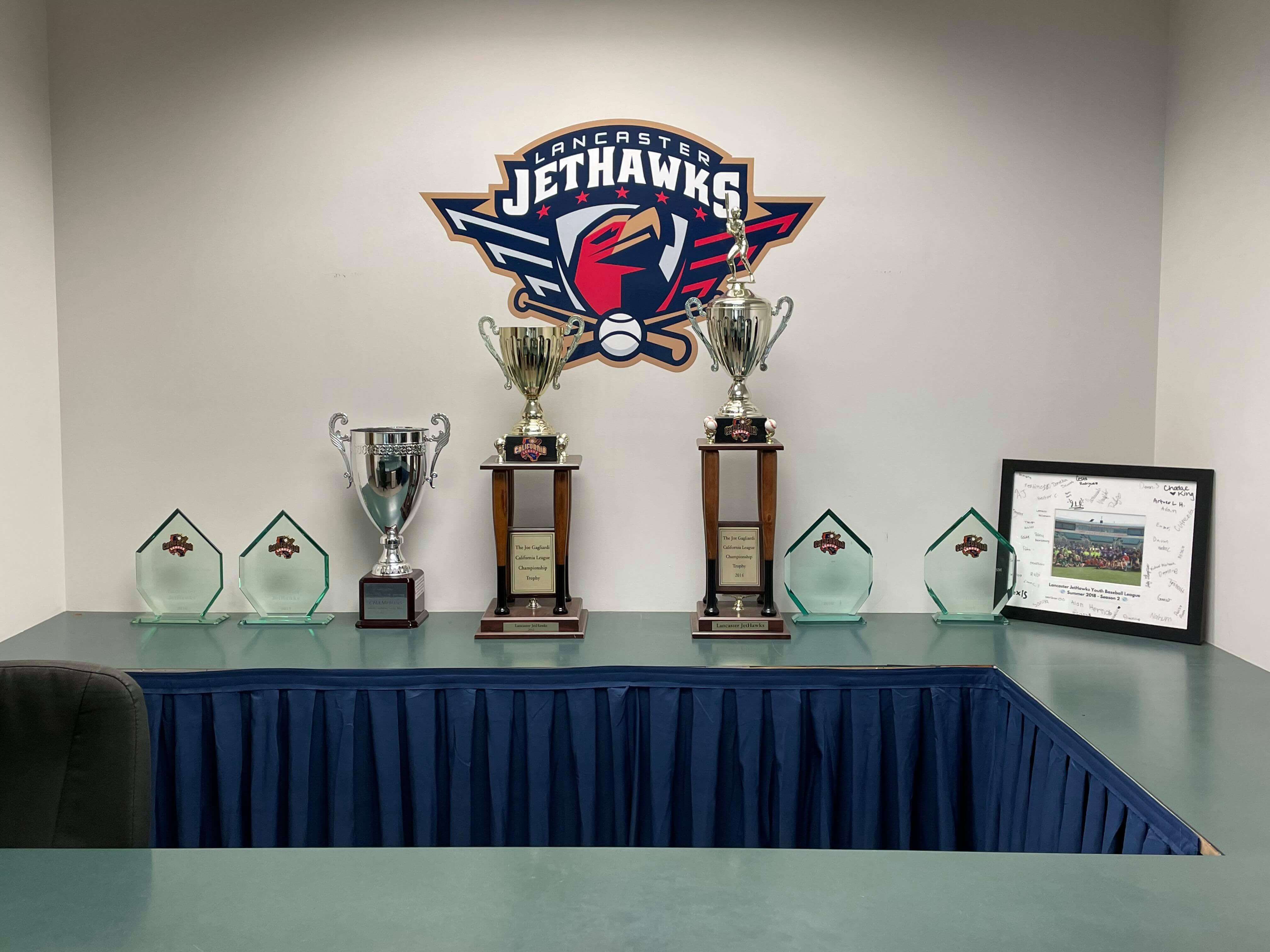
The JetHawks' championship trophies and accolades from the California League. Photo by Tony Quach. - 1/6

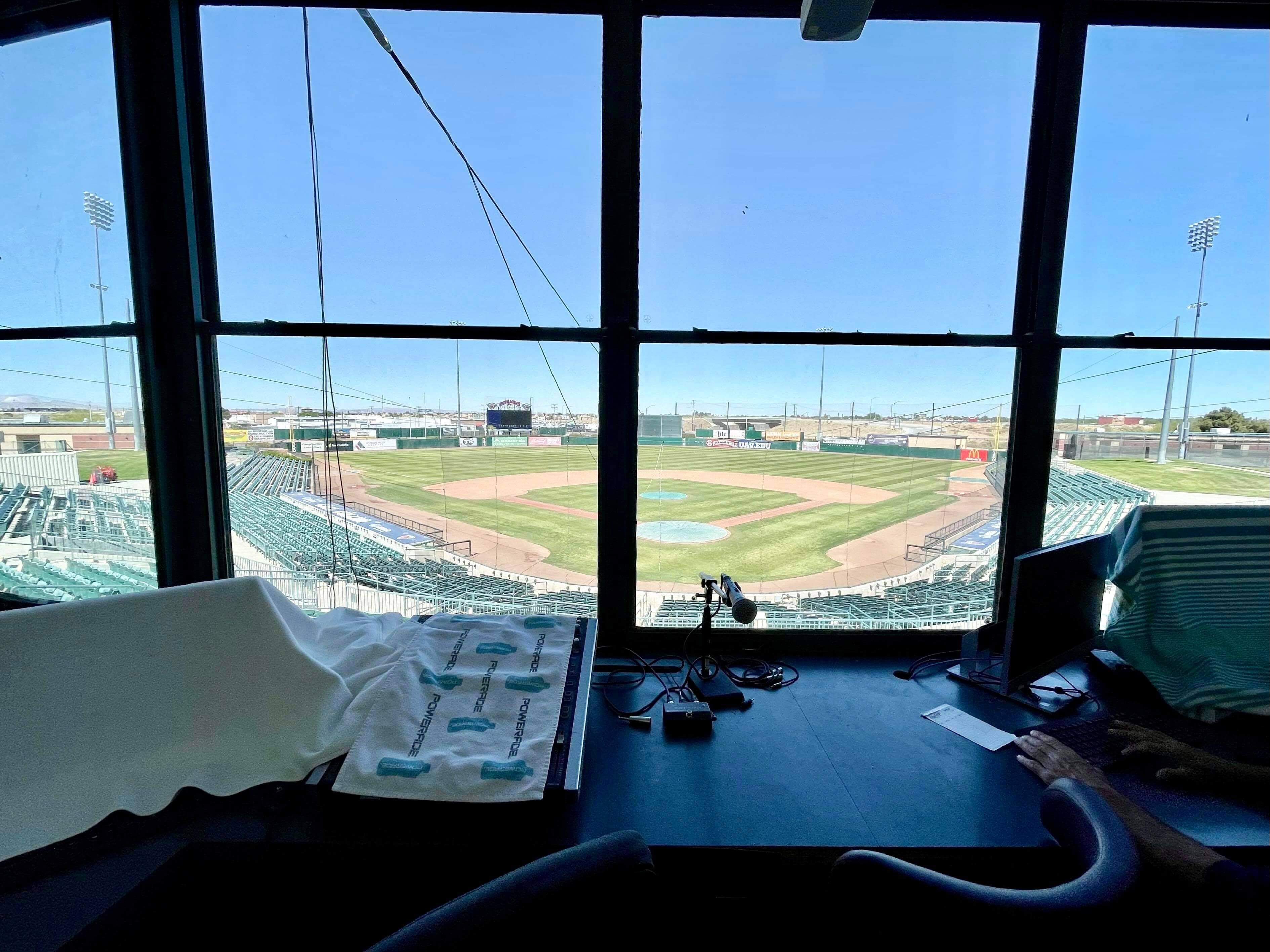


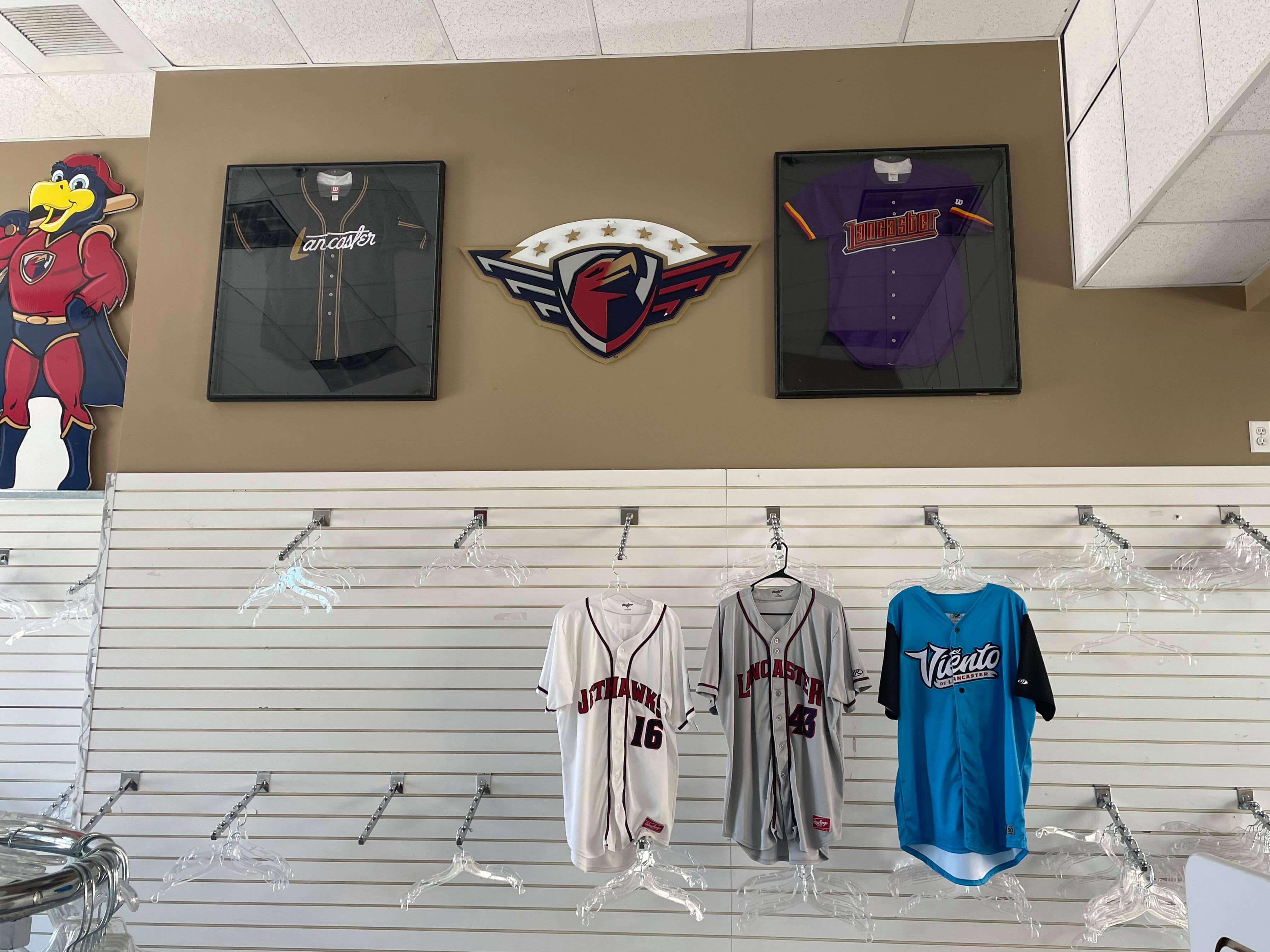
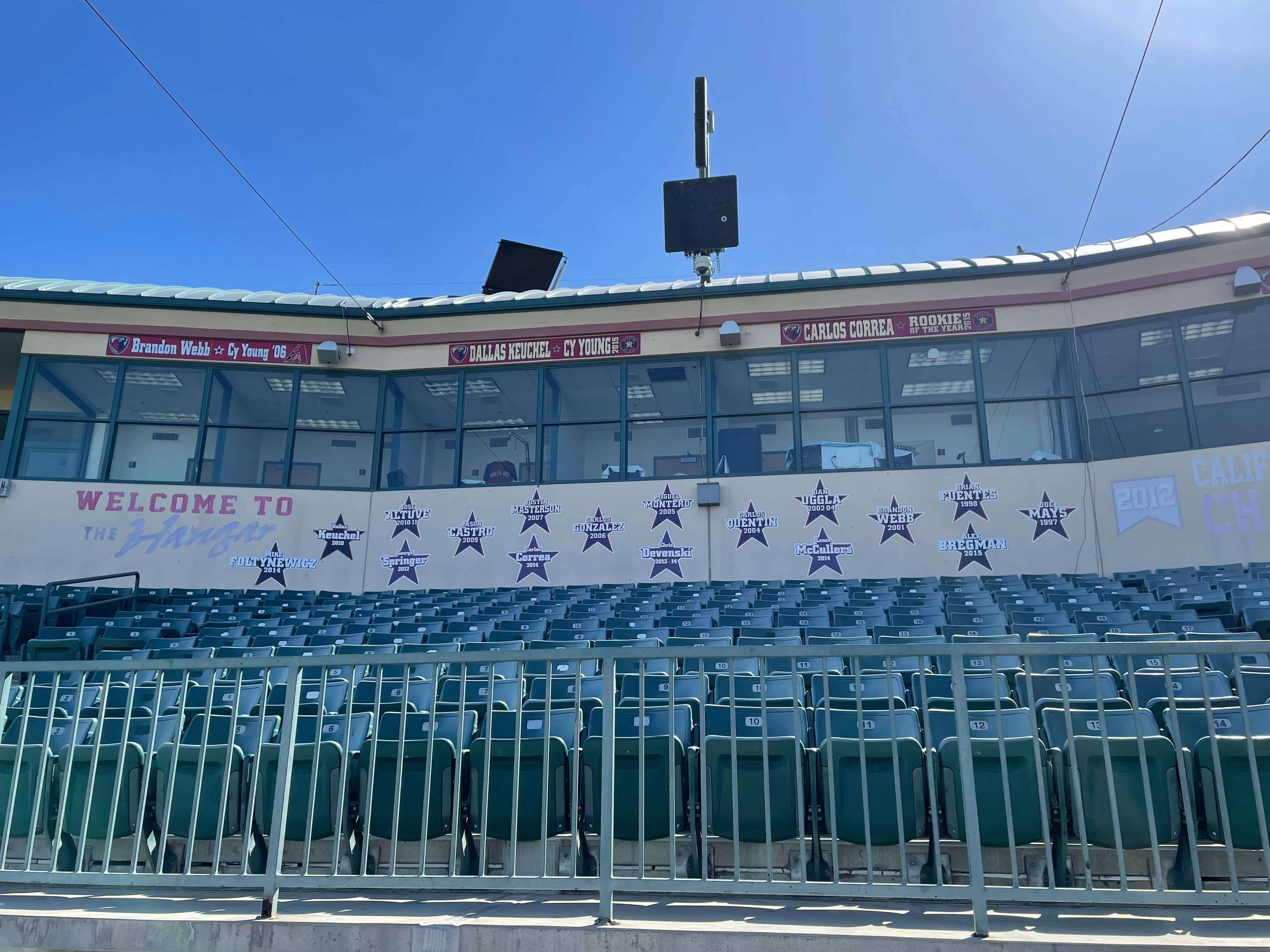
"We've hired an architect [to] look at what options are available to us: amphitheater, park, mixed-use. Just trying to figure out what opportunities exist there," Caudle said.
There were talks of the JetHawks joining the Pecos League, an independent baseball league based out of Houston.
But having the JetHawks take the independent route is simply not feasible.
"They're just not going to draw the kind of thing that MLB does. That doesn't pay the bills. The cost of maintaining that facility is substantial for us," Caudle said. "So, we need to have a corresponding revenue associated with that."
Other alternatives include allowing a Mexican League baseball team use The Hangar, or having a soccer league use it. But according to Caudle, "None of them seem to just play out well and generate any substantial revenue."
Some JetHawks' backers and advocates have an idea why their team got axed.
Because JetHawks' games were played in the hot summer in the high desert of Antelope Valley, the wind could often prove a major factor.
It was a double-edge sword for the JetHawks. Sometimes the wind would favor them and yield high-scoring games; other times it backfired and they ended up on the opposite side of the boxscore.
Regardless, the JetHawks sought to use conditions to their advantage. During its final season, the team became "El Viento de Lancaster" for several Friday night games, celebrating Latino culture in the Antelope Valley.
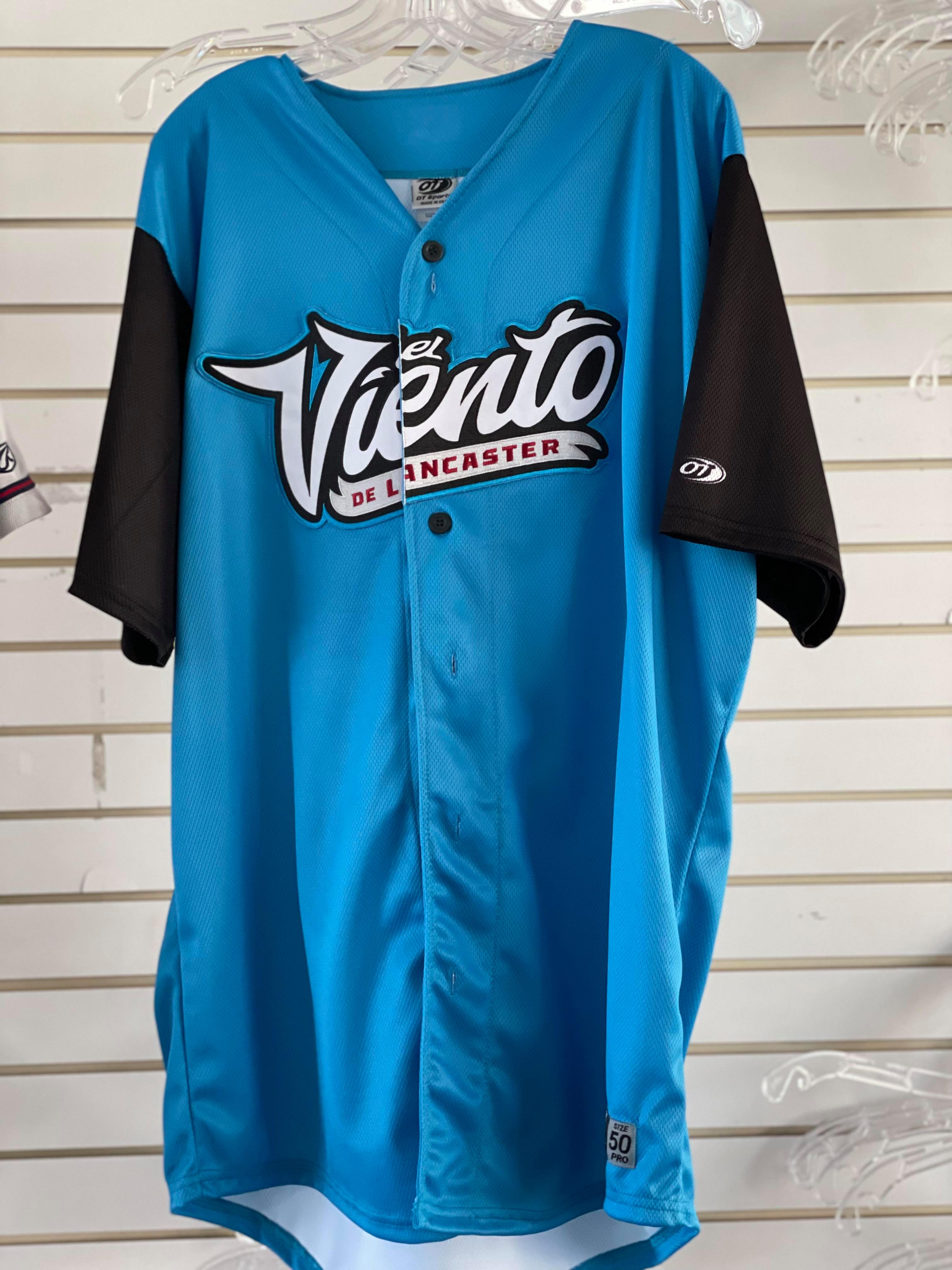
The JetHawks' "El Viento" jersey. For 10 games the JetHawks became "El Viento de Lancaster" on Friday Nights, as they participated in MiLB's Copa de la Diversión Initiative. Photo by Tony Quach.
"El Viento" means "The Wind."
"The wind blows out very hard [and] it is a very friendly place for hitters," Schwartz said. "I know with its reputation around baseball, there are a lot of major league teams that don't want to [be] affiliated with Lancaster. They think it's a hard place to develop their players."
Over the years, the JetHawks sent over 100 players to the big leagues.
Two won the Cy Young award, which goes to the best pitcher in the NL and the AL (there is one award for each league each year) – Brandon Webb in 2006 with the Arizona Diamondbacks and current White Sox pitcher Dallas Keuchel in 2015 with the Houston Astros.
Some of Keuchel's former teammates also spent time with the JetHawks organization – current San Diego Padres pitcher Joe Musgrove, who threw the first no-hitter this 2021 MLB season (and the first in franchise history); and Astros All-Stars Lance McCullers Jr., José Altuve and Alex Bregman, all 2017 World Series champions. Also from that 2017 Astros team, George Springer, now with the Toronto Blue Jays.
The closest baseball to Lancaster in 2021? A Dodger game.
For some, the distance, the hour-long drive and more – the expense, especially – isn't worth it.
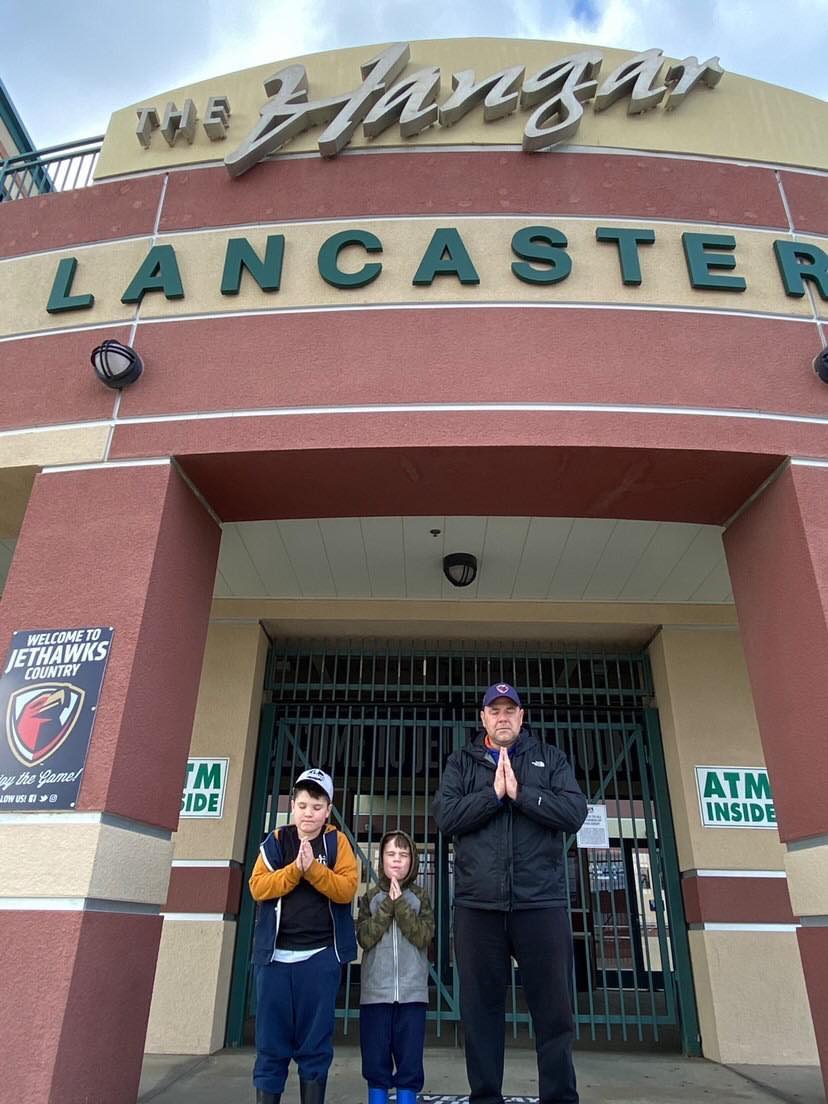
Dean Anthony with his sons, Nico (right) and Luca (left), praying outside The Hangar for their team to be saved. Photo courtesy of Dean Anthony.
"Now, if anybody wants to watch a baseball game, they're going to go spend a thousand dollars in parking, beers and everything else at Dodger Stadium," Caudle said. "It's a different setting and it's a shame. You can go see 10 JetHawks games for the price of one Dodger game. That's the reality of it."
Minor league baseball has been and will continue to be the heart and soul of some towns. The role of the minors goes far beyond just being a farm system for MLB teams. It's about community engagement, about the creation of unique, lasting memories that one may not find in the majors.
One of Anthony's lasting memories was when his sons, 10-year-old Nico, and 7-year-old Luca took part in a JetHawks' pre-game festivities.
"[Nico] got to throw out the first pitch, and [Luca], he got to announce "Play Ball!" Anthony said. "You can never thank anybody, not for an experience like that, and I know that both my boys will remember that for the rest of their life."
He added, "It's still an open wound. All the other California [minor league] teams [will be back], they're going to have their fan base ready to go. It's not fair to us."
Laferney is now working for the city of Lancaster as a senior maintenance assistant. But like many people, he continues to wonder:
Why?
Referring to Rob Manfred, the MLB commissioner, Laferney said, "Because of what he did, [he] ended my baseball career that I've been doing for 25 years, and I'll never forgive [him] for that."